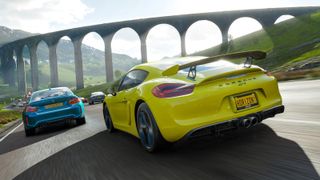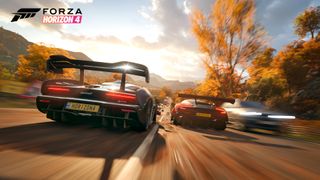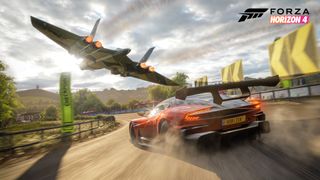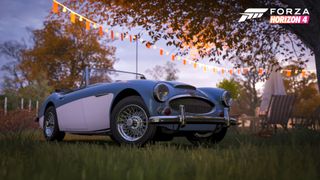How temperature, puddles, and seasonal minutia will affect Forza Horizon 4's 450+ cars
We go in-depth with Horizon's creative director about seasons, and new features (FOV options!) coming to the PC version.

When Mozart wrote Symphony No. 40 in G Minor, he surely predicted it coming to a rousing crescendo at the exact moment I drove through the archway of a stone windmill, launching my car off the apex of a hill for three seconds of sweet air time. I like to think he would've been proud, and suggested that with a better-tuned suspension, I probably could've eked out a little more speed on the grass for a better jump.
Ready to race? Check out our Forza Horizon 4 car list of the best cars, and guides to super wheelspins, barn finds and house locations.
Forza Horizon 4 is a game that lets you drive and daydream however you like. At a recent preview event I spent a good half hour in chill mode, appreciating what a relaxing game this can be. I put on the classical radio, set a waypoint for Edinburgh many miles away, and just drove, admiring the weighty just-right physics of the car and a scenic Britain so beautiful and detailed, picturesque feels both descriptive and literal.
I also drove my way through a handful of events, from straightforward races to movie stunt scenes, in which a fighter jet buzzed over my head as Sean Bean directed my route (just in case you forgot this game is British). I barely poked my head into its customization menus, which started to unlock over the game's first couple hours, but as with previous Horizons there's a deep racing sim awaiting you, if you want to tune every aspect of your car. And if you don't, the driving feels so good already, you can just get straight to racing.
Forza Horizon 4 is out in less than a month, on October 2, and the couple hours I played pointed to it being a predictably great racer. The look and feel of Forza Horizon is well-known at this point, so I talked to creative director Ralph Fulton about what's new. We went in-depth on the biggest new addition, the seasonal system, as well as what we can expect in the PC version of Forza Horizon 4 (unlocked framerate, FOV options and HDR, to name a few things), and Playground Games' ambitious post-launch plans.
Wes: Let's talk about seasons. In the winter, things obviously freeze over. You'll be able to drive on ice. What are the other differences between spring, summer, fall, that affect racing and are more than aesthetic?
Ralph Fulton: The whole water freezing thing is the perfect example of seasons changing something. Everybody can get it instantly. There are loads and loads more, probably slightly more subtle changes that seasons bring. And they all have to do with temperature, with climate, with weather conditions.
What we've gone for with each of our seasons is the best that season can be in Britain, rather than how it normally is.
PC Gamer Newsletter
Sign up to get the best content of the week, and great gaming deals, as picked by the editors.
Raining all the time?
Exactly. Nobody wants that. And this summer we've had the most amazing summer. Very similar to the one we've got in the game. Blue skies, high sun, not a lot of rain, pretty dry. What that means is you're not going to see a lot of standing water. A lot of rivers are lower in the game, and one dries up entirely. So what was once a river becomes a dry riverbed, and there's a race that goes through that. You can imagine the profound effect the seasons have on that particular race. The dirt, the earth, is dry and hard, so there's a lot of grip there.
You move into autumn or spring, they're the rainier seasons, and suddenly there's more water on the road. Which means more puddles, sometimes it means standing water. Again, all that has a real physical effect on your car. So ride height, chassis design are going to have an effect on how you move through that water, and will also probably cause you to think about lines. The fastest line isn't necessarily the shortest line, you're going to want to skirt that water if you can.
The earth, because it's wet, sometimes will start turning to mud. We have this new deformable mud tech. You can really see your car churning through the deformable mud and feel that in your tires and suspension. Obviously winter has visually the most profound change. All the trees have lost their leaves, these incredible skeletal silhouettes the trees form are visually striking. Very practically, there's lots of snow. Not everywhere, but certainly snow with altitudes, so we have the deepest snow in the north of the world. And again that snow is deformable, so you can see your car cutting through it.

Also a lot of ice, frost on fields, and obviously the marquee 'the lake has frozen' kind of thing, which reveals a bunch of new gameplay opportunities as well. Every season can bring its own physical changes to the world. Certainly it changes the decision-making you have on a corner-to-corner basis, in terms of the line you're taking, your braking points, maybe even the vehicles you're taking into events.
It sounds like a lot of the hardcore car nerds will, every time the season switches over every week, go in and adjust all their suspension, tweaking all those car features I saw in the menus.
I'm sure. I think one of the real strengths of Forza all up, but particularly in Horizon, is you can do that, but you don't have to do that. I think striking that balance so that if you are of that mind, there's depth for you to lose yourself in, in terms of setting up your car, upgrading your car, changing your tires, ride height, stuff like that. But equally, if you want to play it in a very approachable, accessible way—like I do, if I'm honest—you can never go into that area of the game, and still have a fun and deep time just with the way the cars handle out of the garage.
With this being the fourth Forza Horizon game, a lot of the things you add to it are iterative. For the seasons, how much of the technology to bring that to life did you already have in those previous games? You mentioned the deformable mud is new, but say, how the car reacts to small puddles of water versus big bodies of water. How much new driving tech did you have to put in the game?
I think it's a combination of stuff we already had and stuff that we had to write the code from scratch. More than that, the challenge of seasons isn't so much that work, it's the fundamentals that bring it all together within a world the size of Horizon 3's Australia. That's the size of our world, but you also need to be able to switch it between the four seasons.
And that means basically the tools and the pipeline to create all those assets—a tree without leaves, a tree with brown leaves, a tree in full bloom—but also to be able to swap between then in a memory- and time-sensitive way. So there's a ton of systems work that has gone into it, which has been the bedrock of the seasons system.
When you have returning cars that have been in previous Horizons, are there things that you go in and change in the way the cars drive?
Everything in our physics system is systemic, rather than hand-tuned. There's a couple very good reasons for that. One, that we're now at 450+ cars.
So you just can't do each one, individually—
You can't, absolutely. Although, we do go in and we fix things and tweak things about individual cars, but generally speaking we need a system that creates physics for all those cars programmatically. The second is, if your underlying physics systems are good enough, and ours are, going back more than a decade, it's actually a preferable way to create car handling dynamics than the sort of old-fashioned way of a designer going 'I guess it would feel like this?' or 'I drove a car like this once, and I think it felt like this.'
Removing that subjective element and making it about math, about actual hardcore physics calculations under the hood. That's what enables us to have this many cars, all with this really weighty, authentic feel and physics. That said, we can go in and change cars, and there are a bunch of things we'll do at a systemic level, which has a fundamental knock-on to the way a large proportion of cars feel.

I'll give you an example. With seasons now we have the concept of temperature in our world, which we've never had before. If you pause the game, now in the pause menu there's a weather tab that shows a weather icon and a temperature readout. That's actually showing the current ambient temperature in the world, and every surface in our game has a conductivity value which determines how heat conducts through it, into tires, as you drive over them. And that actually has a moment-to-moment effect on the temperature of the tires, which then knocks on to the grip and other handling characteristics. So you can drive the same car through the course of a day, and as the temperature dips at night, you'll start to feel the dynamics change just based on the temperature.
So even if you were driving the same car in Forza Horizon 3 as this game, that's one added element that would make it feel a little different.
Totally. And to take it even further, you could be driving that car in the morning and drive it at night and get slightly different handling characteristics just because temperature has that kind of effect.
Where does all the data for that come from? Like what a specific model of Ferrari should feel like? Where does that math come from?
The data input varies from car-to-car. We harvest it from a range of things, like manufacturer data, our own testing, and also standardized testing that you can access. The proportion of each we use is determined by how robust any one of them is. Generally speaking, even for some of the oldest and rarest cars, we can get enough of the data to input into our physics black box to then output the car handling data. And oftentimes there's kind of a trial-and-error thing there, where we'll spit it out, we'll try it, it's clearly lacking something, and that'll point us to the thing we need to go back and find with an additional layer of research.
The harder ones are the older cars, where you're going way back. We go back to the 1930s in this game.

What's the oldest car in this game?
I think it's a 1930s Bentley, a Bentley Blower I think it's called, and that's where you're getting kind of into the realms of [using] any data you can glean on that, because there's no way you're taking that out on the track. There's probably only one or two that still exist and they're not going anywhere. So there's an element there of just finding the best you can in order to put it into our black box. But that's part of the fun.
I was going to ask, is it almost more fun for it to be mysterious than a car where you just get a perfect ream of data?
It depends how up against [a deadline] you are, because when you're up against it having someone hand you a file of data and you can just put it in and it's done, that's great. But there is a lot of fun in the detective work as well. Not just in getting that data, but also sometimes in tracking down cars entirely, whether they are one-of-a-kind cars that are now in private collections and you have to go find them.
We had a situation where our research team were waiting at the end of a route in a sort of off-road rally in Brazil for a car to finish so we could get access to it for the 2-3 hours we'd need to get all the photography we'd need before they took it to bits and shipped it to the next rally. We have to do those sorts of things from time-to-time just to get particular vehicles.
What can you tell me about the PC version? I've been playing the Xbox version, but I'm obviously curious to know ways this will differ from Forza Horizon 3. Framerate caps, HDR support, the works.
Let me give you the full spiel. The first thing to say, really high level, is man we learned a lot from shipping on PC with Forza Horizon 3. It was the first time we'd done that as a studio. We learned an enormous amount about what it takes, particularly with DX12, to work with the card manufacturers, and achieve performance and stability. To the point that we didn't finish working on the PC version of Forza Horizon 3 until pretty much a year after we launched it. We kept a team working on that. And I think if you speak to the community, generally speaking they feel we did a good job in that time. [We went] from not a great place for a lot of people when we launched, to a place where a lot more people were happy with the performance they were getting out of their rig and the game.
So that experience has stood us in good stead, I think, to the point where we have been more prepared and better positioned to develop the PC version of 4. We've also done a bunch of things that will be good news for our PC fans. There's a benchmark mode which we didn't have last time. I think it's a very competitive one, when you look at the landscape for that kind of benchmark mode. It's going to do a good job ahead of time of letting people know what their rig is capable of, with regard to the game. It'll show them some nice graphs.

I think we've listened to our PC players and responded to some of their big asks. Configurable field of view is something PC players really value. Never been an issue on console, but PC players want it. They have it now. We've done that for this game. We support HDR, we support Dolby Atmos. I think we have more graphical sliders than we had last time, again just trying to give more control to our PC players. And also a lot of them you can push beyond 'ultra' into 'extreme' we call it. It's not a preset, but if you want to go in manually and push things up, if your rig can handle it, the game will let you do it.
The overall theme is giving more control to PC players, and in addition we've got better USB support, better peripheral support, and the game's Xbox Play Anywhere, so buy it on PC and you're getting it on Xbox, whether you want it or not.
Does it run at 60 fps, or is it unlocked?
For recommended spec, this time we're targeting 60 frames per second performance where previously we targeted 30. Big change. And yes, you can unlock and have an uncapped framerate if that's the way you set yourself up and your PC can handle it.
Have you done any technical support for really hardcore racing fans with triple monitor setups and that kind of stuff?
You can do that, and we also support 21:9 ultra widescreen as well. I think we supported that last time.
With the season changing every week, I'm guessing you're going to have events specific to each week. Can you talk about some of those?
Totally. We're using the weekly calendar, which is implicit in the seasons now, to do a bunch of things just to freshen up the game. We have seasonal events and championships, and some seasonal PR stunts as well. We have seasonal barn finds, which only appear in a certain season. We have a new Forzathon weekly thing aligned with the seasons, so you get a good chunk of gameplay with some good rewards, an hour or hour and a half's worth of gameplay, refreshing every single week.
And then the points that you'll earn from that you can spend in the Forzathon shop, the stock of which refreshes every week. It's kind of a limited shelf-space store, with some of the best things in the game, if you don't want to wait for a wheel spin to turn them up, you can go in and spend points.
There are a lot of things rotating on that weekly rhythm that comes with seasons, and if you think of four seasons as a year in Horizon life, at the end of every four seasons we're going to bring a bigger update to the game, for free, for everyone, which brings new gameplay or features or content or customization options. Whatever happens to be in that 'year's' update. So the game's going to be updating and growing for free for everyone, which is great.
That's a fast schedule to be putting out a significant update for the game.
It is, and it's obviously required investment in that team. We're investing in some skillsets that we just haven't had in the studio before. We're bringing in people, particularly on the community side, who can go have a dialogue with our players. Obviously we have our ideas for things we can bring to the game and improve it, but we want this to also be a better conversation with our players, listen to what they don't like and want fixing, things they'd like to see in the future. I think there's a collaborate roadmap to come out of that process.
Are you thinking about holiday events, Disneyland-style, like in December everything becomes Christmasy?
There's a great maxim in the creative world, which is always throw away your first idea. So that's an idea we've thrown away. [Laughs] Everyone kinda goes, 'will you have pumpkins at Halloween?' If that's what you want, dudes, but is it really what you want? I think we're thinking bigger than that.
An update is for a month, so our first update will come in the tail end of October, and it'll be for November. So sure, we could do Halloween, but actually I think we're going to think a bit more macro than that. Think about the types of things players will be wanting to do in their second 'year' of Horizon life.
Are those updates coming once a month going to be separate from some of the bigger things you did with Horizon 3, like the Hot Wheels DLC, for example? That was very much a standalone thing.
Absolutely. If you think about things we traditionally do, expansions are something we love doing in Horizon and our fans love us doing, so if anything we plan to do more of them. We've announced that there will definitely be two. Those two expansions are included now in Ultimate Edition, and they weren't last time, so I think that's a great value-add for players.
The other thing we've done is monthly car packs, and we've taken this opportunity to think about that, reassess it, and the way we're doing it now, we're aligning it with the season. If you're in Car Pass, and that comes with Ultimate Edition, you'll get two cars delivered to your garage with each new season. So again, everything's falling into that weekly, yearly sort of cadence as well.

Wes has been covering games and hardware for more than 10 years, first at tech sites like The Wirecutter and Tested before joining the PC Gamer team in 2014. Wes plays a little bit of everything, but he'll always jump at the chance to cover emulation and Japanese games.
When he's not obsessively optimizing and re-optimizing a tangle of conveyor belts in Satisfactory (it's really becoming a problem), he's probably playing a 20-year-old Final Fantasy or some opaque ASCII roguelike. With a focus on writing and editing features, he seeks out personal stories and in-depth histories from the corners of PC gaming and its niche communities. 50% pizza by volume (deep dish, to be specific).
Most Popular




